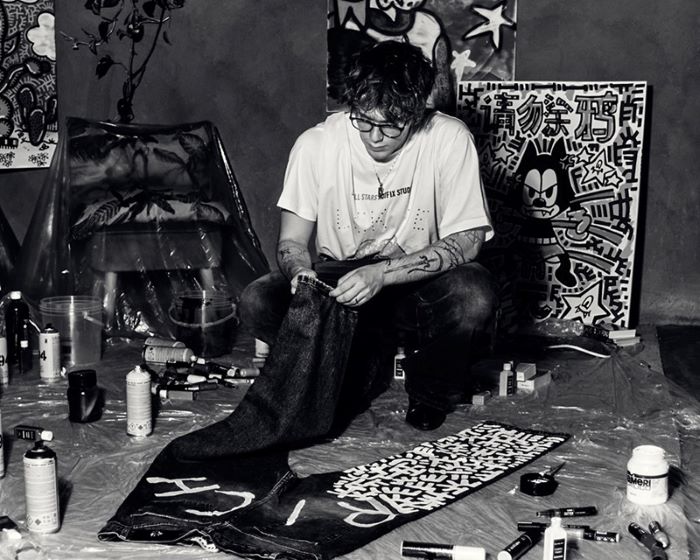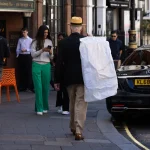EU Recovery Fund Package
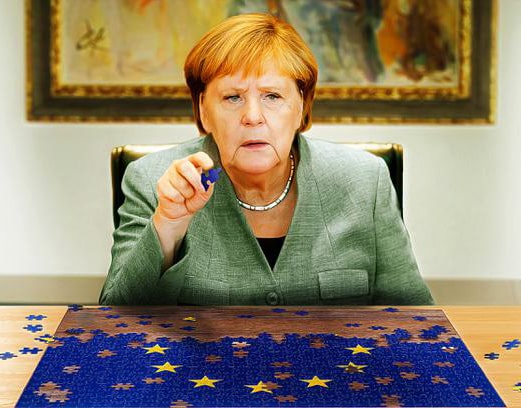
Update Below.
The heads of state and government are meeting in Brussels for the first time since the start of the corona pandemic at the European Council on Friday (July 17, 2020). They are negotiating with the “Recovery Fund” about the largest aid package that has ever been debated in Brussels.
It is about €750 billion and thus the future of Europe. Whether the continent has a chance to pull itself out of the biggest economic crisis of the past decades will be decided in Brussels in the coming days. Chancellor Angela Merkel moderated in the middle of her 66th birthday between the conflicting egos of the continent. After 15 years in office, the Chancellor is on her way to what may be her last major international mission.
Chancellor Merkel is dealing with a continent where there is little evidence of solidarity:
► The “Frugal Four” – Austria, Denmark, Sweden and the Netherlands oppose the fact that the Corona Aid Fund is intended to provide 500 billion euros in grants primarily to the hard-hit southern countries.
► The Dutch Prime Minister Mark Rutte said in advance that he saw the situation as “rather bleak” and would only like to distribute loans. In return, grants would have to be linked to “fundamental reforms”.
► Hungary threatens to veto if the payment is tied to compliance with the rule of law. The EU and Hungary had been in a conflict over Hungary refusing to take immigrants.
The German Minister of State for Europe, Michael Roth (SPD), sums it up as follows:
“We don’t have time now to do long arguments again. We now need a clear signal that we are helping and that we stand up for one another.”
Conclusion: dealing with the most existential crisis in its history will show whether the EU is able to answer major questions of the time with a common approach. If there is no quick and strong solution to dealing with the consequences of Corona, then Europe also lacks the strength to find a joint solution to the climate crisis, digitalization or foreign policy threats. Then Europe remains a culturally rich continent – but without being geopolitically competitive with other regions of the world.
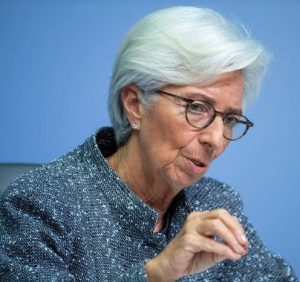 Even Europe’s monetary authorities are becoming increasingly concerned. The President of the European Central Bank (ECB), Christine Lagarde, said in Frankfurt:
Even Europe’s monetary authorities are becoming increasingly concerned. The President of the European Central Bank (ECB), Christine Lagarde, said in Frankfurt:
“It is important that those responsible in Europe quickly agree on an ambitious package.”
The central bank hopes for an agreement on the proposed €750 billion package. A large number of those responsible for politics are “quite aware of the importance of not wasting time”.
And further:
“It is necessary to be able to signal to Europeans, investors and the world that there is a determination to invest together and to support each other.”
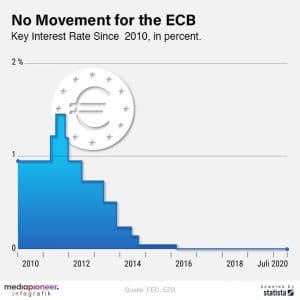 Europe’s monetary authorities are taking a break in the fight against the corona crisis. The Council of the European Central Bank left the key interest rate in the euro area at a record low of zero percent. European monetary policy pauses in the corona crisis.
Europe’s monetary authorities are taking a break in the fight against the corona crisis. The Council of the European Central Bank left the key interest rate in the euro area at a record low of zero percent. European monetary policy pauses in the corona crisis.
(From the original by Gabor Steingart. Translated by NewsGateNY.)
Update:
The “Frugal Four” turned into the “Frugal Five” with Finland joining the group.
The number one winner is Austrian Chancellor Sebastian Kurz. He united the five economies – all of which had a gross national product of three times North Rhine-Westphalia – into a powerful political bloc.
This alliance has succeeded in reducing EU grants, which are in fact gifts, from the planned €500 billion to €390 billion. Plus: The annual discount for Austria’s contribution to the EU budget was increased from EUR 237 million to EUR 565 million, which corresponds to an increase of 138 percent. This is how Sebastian Kurz, the thrifty, can be seen at home. Since Bruno Kreisky, no Austrian chancellor has made Bella Figura like this on the international stage.
The number two winner is Italian Prime Minister Giuseppe Conte. In a video conference on Tuesday morning, he rightly described the decisions as “a historic moment for Italy.” Conte managed to get €208.8 billion out of the reconstruction fund for the dysfunctional Italian statehood instead of the originally planned €172 billion, of which €81.4 billion will be in grants and 127.4 billion in loans.
In addition, he was able to ward off the veto right demanded by the Dutch when paying the subsidies. The Italian inability to build a modern statehood with a functioning tax administration is not punished, but rewarded. In the opinion of world-renowned journalist Gabor Steingart, Europe did not give the Italian patient medicine, but injected new hallucinogens.
